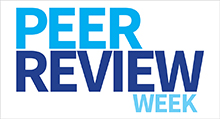 Peer review – in all its forms – is central to scholarly communications. From funding applications through journal submissions to hiring and promotion decisions and beyond – all rely on some form of peer review. The changing needs of researchers – especially as a result of the move to digital and the globalization of scholarly research – are not just leading to new forms of publication, but also to new forms of peer review. Traditional publishers and startups alike are experimenting with open peer review, transferable peer review, peer review validation, and more. There is also increased awareness of how much time researchers are spending on peer review and the need for this to be recognized – and valued – by their institutions, resulting in new ways of enabling credit for this (see, for example, Publons).
Peer review – in all its forms – is central to scholarly communications. From funding applications through journal submissions to hiring and promotion decisions and beyond – all rely on some form of peer review. The changing needs of researchers – especially as a result of the move to digital and the globalization of scholarly research – are not just leading to new forms of publication, but also to new forms of peer review. Traditional publishers and startups alike are experimenting with open peer review, transferable peer review, peer review validation, and more. There is also increased awareness of how much time researchers are spending on peer review and the need for this to be recognized – and valued – by their institutions, resulting in new ways of enabling credit for this (see, for example, Publons).
Unsurprisingly, then, it’s been the topic of many a Scholarly Kitchen post – 415, to be exact, if our search results are to be believed! Recents posts have covered issues as diverse as credit for peer review, sexism in peer review, and fast track peer review. The comments generated by these posts are often as interesting – and revealing – as the posts themselves. Peer review is a subject that – despite the fact that most researchers continue to trust it – divides opinion in the wider scholarly community. There is certainly much to discuss, but there is also much to celebrate!
At least, that’s the conclusion that a small and rather disparate group of us – ORCID, ScienceOpen, Sense About Science, and Wiley – came to a few weeks ago when talking about our individual organizations’ efforts to support peer review. As a result of that conversation, we decided to experiment with an informal Peer Review Week celebration, one that we hope other members of the scholarly community will support and engage with. And, perhaps, one that might grow into an annual event that honors the central role peer review plays – and, we believe, will continue to play – in scholarly communications.
At ORCID, we have been working with Faculty of 1000 and other members of our community to help researchers get credit for peer review by developing new functionality that enables organizations to add peer review activities to ORCID records (with the record-holder’s permission). ScienceOpen’s interest in peer review stems from their commitment to a completely transparent post-publication peer review process, which requires reviewers to follow a pretty stringent checklist. Wiley is putting its money where its mouth is by establishing a global team of peer review experts, providing support for reviewers with initiatives such as their reviewer resource centre, and by experimenting with new approaches to peer review. But Sense About Science – who joined the group to ensure the wider benefits of peer review as a quality mark and tool for making sense of science claims are shared with the public – are, for me anyway, especially synonymous with peer review. For a small nonprofit with limited resources they’ve had a huge impact on our knowledge about how scientists view peer review, on public (and policy-makers’) understanding of peer review, on training for early career researchers, and more (details here).
So it’s fitting that Peer Review Week will begin on the same day as Sense About Science’s Annual Lecture on September 28, and run through October 2. Planned activities include:
- Daily posts about peer review on our blogs
- Twitter campaign (#peerrevwk15)
- Webinar on Trust and Transparency in Peer Review with Kent Anderson (AAAS), Verity Brown (St Andrews University), Alexander Grossman (ScienceOpen), Laure Haak (ORCID), and Andrew Preston (Publons)
- Video of top 10 peer review tips
Having set ourselves a somewhat insanely tight deadline for Peer Review Week, we unfortunately had to keep the number of organizations involved in the initial planning to a minimum in order to make anything at all happen! But we know that there are many, many other organizations and individuals out there who care about peer review just as much as we do – and we want you to get involved! Our hope is that as many of you as possible will contribute to what is intended to be a community-driven discussion about – and celebration of – peer review. If you can help us make a success of it at short notice and on a shoestring this year, just think how much bigger and better it could be with your wider (and earlier!) participation next year…
Discussion
22 Thoughts on "Peer Review Week – A Celebration!"
Great. Just great.
In the future could a campaign beyond just the ScholComm (sorry!) industry be envisaged? For journalists – the difference between a peer reviewed paper and a press release, and how to critically evaluate a paper (a precis of ‘How to Read a Paper’ for example)
Something that helps the lay public interpret the ‘facts’ presented in lay media perhaps.
Surely politicians need educating here as well. The new leader of the UK Labour party might well join the current UK Health Minister (Convervative) as being advocates of homeopathy. The US Congress is lacking somewhat as well.
Peer review as you say is central to our world but communicating its core value to the wider world is also something we need to do better.
To be fair, one of the main participants here is Sense About Science who do just the sort of outreach you’re describing.
Martin, suggest you visit and read the new University of Florida initiative “Gatorbytes” digital editions written by journalists to translate research at UF. Free downloads can be found here:
Thanks both (David and Meredith). Points well taken. I would hope future week can build in these initiatives (recognizing that Sense about Science do get Radio 4 coverage in the UK) to really make people who can make a difference get a better idea of how peer review works.
Excellent! On behalf of Open Scholar C.I.C., an open membership organisation of volunteer scholars and librarians dedicated to improving academic peer review, I would like to ask how we could get involved and support this initiative.
To add to the list:
COPE just had a forum yesterday about “who owns peer review”.
Also at Elsevier we try to make peer review a measurable research output. As it was mentioned in the post, researchers, specifically early career and young ones have to be recognized for the time and effort they put on peer reviewing manuscripts on a voluntary basis.
Elsevier provides its journal reviewers a personal review profile page that is only accessible to them. Reviewers can see their 5 year review history records per journal (only the year and month of review submission is recorded) and collect their perks and rewards from there. It is then up to them to make their review profiles public and/or list their peer review records for non-Elsevier titles (again only the journal title and review year will be listed). More about this initiative can be found in our recent article: http://www.elsevier.com/connect/giving-reviewers-more-of-the-recognition…
Another initiative at Elsevier is publishing peer review reports next to articles, about which we wrote an article some time ago
http://www.elsevier.com/reviewers-update/story/peer-review/elsevier-pilo…
Bahar again:
Sorry about the broken link. The correct one is here:
http://www.elsevier.com/connect/giving-reviewers-more-of-the-recognition-they-deserve
Thank you Bahar, but the second link is not working either.
Thanks for letting me know Pandelis and sorry for not checking both links at first place.
here is the correct link to the article about publishing peer review reports as articles:
http://www.elsevier.com/reviewers-update/story/peer-review/elsevier-pilot-trials-publishing-peer-review-reports-as-articles
Thanks all! We know there’s loads of great work going on around peer review and really hope this week will help highlight much of it. If possible, we want to create an open web resource for peer review in future – for scholars, the public, and policy-makers alike.
For anyone who’d like to get involved, please publish posts or articles about what you’re doing on peer review, or celebrate in any other way you choose – and be sure to tweet using #peerrevwk15 so we can follow what you’re doing and help promote it.
I’m hoping #peerrevwk might encourage research into peer review — that’s also one of the goals of our new journal, Research Integrity & Peer Review (see http://www.researchintegrityjournal.com) — we need to know more about it, and we need proper research, properly funded.
Great initiative, celebrating such a cornerstone of scholarly publishing. Re: resources about peer review, I think there is a need for further demystification of what exactly scholarly peer review (PR) entails. It’d help if the industry, maybe through COPE, could offer general guidelines about the different levels of acceptable PR. For example, a new mega-journal from a well-respected publisher is offering “rapid, binary (accept/reject) PR” — does that meet bare minimum? In many other journals, a single reviewer seems to be the norm. Editorial screening is becoming sort of a loophole, where biases can easily creep up, as often only one editor decides whether or not a submission goes out for PR. Simply stating single- or double-blind doesn’t cut it anymore, we need a vendor-neutral PR transparency index. It’d shed some light on deceptive (AKA predatory) journals that lurk in the dark thanks to the secrecy with which PR is normally held in scholarly comms.
Felipe — you raise a really important question. While peer review (and its purposes) have never been very tightly defined, and it has been used slightly differently, in the past, by different journals, just recently that variation has increased to such an extent that some definitions of what is and isn’t peer review would be really helpful. There is so much difference between mega-journals (ie unselective), highly selective journals, plus those with new models, such as F1000Research. I think this could go beyond COPE (as it isn’t just an ethical issue), although somebody needs to start the discussion and take the initiative!
Great initiative and nice article Alice. For our part, every week is peer review week at Publons, and we’ve already started pushing out peer review resources and insights from our 180,000 review dataset on our just re-launched blog (see e.g. http://blog.publons.com/peer-review-essentials-for-the-beginning-peer/). We’ll ramp up our efforts towards the end of September in support of peer review week.
Looking forward to it!
Check out a recent editorial, “Ten Reasons Why Peer Review Makes Sense”
J. Phys. Chem. Lett., 2015, 6 (13), pp 2588–2589
http://pubs.acs.org/doi/abs/10.1021/acs.jpclett.5b01280


